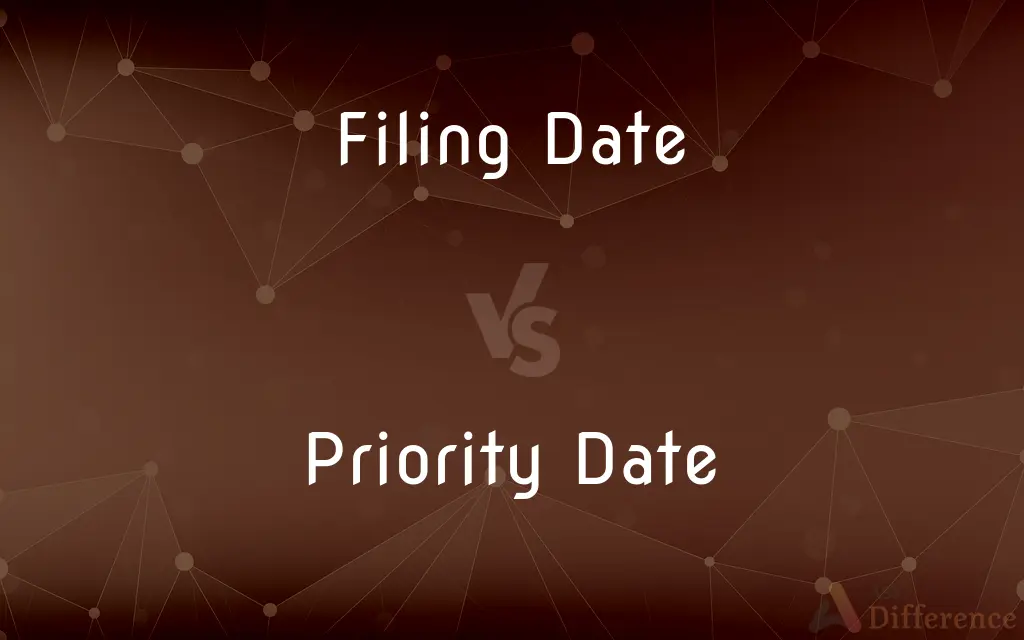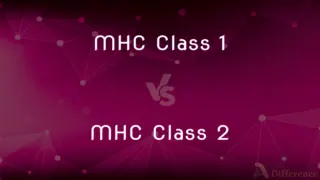Filing Date vs. Priority Date — What's the Difference?
By Tayyaba Rehman — Published on December 25, 2023
"Filing date" is when a legal document is officially submitted; "priority date" is the applicant's place in line for visas, establishing who files first.

Difference Between Filing Date and Priority Date
Table of Contents
ADVERTISEMENT
Key Differences
The "filing date" is the specific date on which a document, often a legal or patent application, is officially submitted and recorded. In contrast, the "priority date" in immigration is the date when the U.S. Citizenship and Immigration Services (USCIS) receives your petition, which determines your place in the waiting line for a visa.
While the "filing date" marks the official recognition and record of a document, establishing a timeline for potential future disputes or claims, the "priority date" is crucial for applicants awaiting visa availability, especially in categories subject to annual limits.
The "filing date" is universally acknowledged as the commencement of the legal timeline for the document filed, be it a patent, lawsuit, or another official submission. However, the "priority date" serves as a benchmark in immigration, ensuring fairness by processing applications in the order they are received.
For inventors, the "filing date" of a patent application is pivotal in establishing their claim to the invention, whereas the "priority date" is less common in this context, often referring to the filing date of an earlier, related application for the purpose of establishing precedence.
In summary, the "filing date" refers to the official submission date of various legal documents, while the "priority date" is predominantly used in immigration contexts to establish an applicant's place in the often lengthy visa queue.
ADVERTISEMENT
Comparison Chart
Context of Usage
Legal documents, patents
Primarily immigration
Significance
Establishes official record
Determines queue position
Impact
Legal claims, timelines
Visa availability
Common Documents
Lawsuits, patents, applications
Visa applications
Legal Relevance
Can determine invention ownership
Fairness in visa processing
Compare with Definitions
Filing Date
Marks the start of the legal timeline for a document.
The lawsuit's success hinged on its filing date.
Priority Date
A benchmark date in immigration processes.
The priority date governs the wait time for family-based visas.
Filing Date
The date a document is officially submitted.
Her patent's filing date was April 15, 2022.
Priority Date
The receipt date affecting visa wait times.
His priority date set him back further in the queue.
Filing Date
Official record date for legal or official papers.
They verified the contract's filing date for accuracy.
Priority Date
The date setting the order for visa applications.
Applications before the priority date were processed first.
Filing Date
The recognized date a document enters official records.
The filing date on the application was illegible.
Priority Date
A crucial date determining visa availability.
Due to a backlog, visas past her priority date were unavailable.
Filing Date
The submission date that can affect legal outcomes.
Due to an earlier filing date, his patent was granted.
Priority Date
Establishes an immigrant's place in the visa line.
Her priority date finally became current for a visa.
Common Curiosities
Why is the "priority date" important in immigration?
It determines an applicant's place in the visa queue, affecting when they may receive a visa.
Can "filing date" affect the outcome of legal proceedings?
Yes, it can establish timelines and precedence in legal contexts.
Does the "filing date" apply only to legal documents?
It's most common in legal contexts but can apply to any officially submitted document.
Is the "priority date" used outside of immigration contexts?
Rarely; it's predominantly used in immigration to determine visa queue positions.
Do "filing date" and "priority date" refer to the same thing?
No, "filing date" is when a document is officially submitted, while "priority date" refers to an applicant's place in line for visas.
How does one find out their "priority date"?
In U.S. immigration, it's typically the date USCIS receives your visa petition.
Can the "filing date" be different from the date the document was written?
Yes, the "filing date" is when it's officially submitted, not when it was created.
What happens if my "priority date" is not current?
It means you must wait longer until a visa becomes available.
Why is the "filing date" important for patent applications?
It establishes the inventor's claim to the patent.
Can the "filing date" be used in disputes over patent claims?
Yes, it helps establish who filed for the patent first.
What documents typically have a "filing date"?
Legal documents, court papers, patents, and official applications.
Can two applications have the same "priority date"?
Yes, if received simultaneously, but subsequent processing may differ.
Are there legal implications if the "filing date" is recorded incorrectly?
It can affect timelines and legal standings, so accuracy is crucial.
Does the "priority date" ever change once it's set?
Generally, no, it's fixed once your application is received.
What if my "priority date" is current but there are no visas?
You must wait until visas become available, despite your current status.
Share Your Discovery

Previous Comparison
MHC Class 1 vs. MHC Class 2
Next Comparison
Bed Bugs vs. FleasAuthor Spotlight
Written by
Tayyaba RehmanTayyaba Rehman is a distinguished writer, currently serving as a primary contributor to askdifference.com. As a researcher in semantics and etymology, Tayyaba's passion for the complexity of languages and their distinctions has found a perfect home on the platform. Tayyaba delves into the intricacies of language, distinguishing between commonly confused words and phrases, thereby providing clarity for readers worldwide.













































